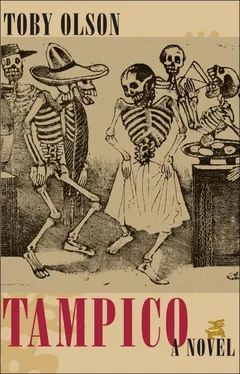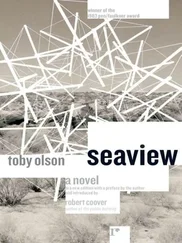“That’ll be Carolyn,” Frank said.
It was a story they all knew, the bones of it at least, about Frank, going out for candling, catching his mother in the coop. She was bedding the one hand they had there, a boy no older than Frank himself then, though it was not those details that would hold the point of the story, but things in the aftermath that Frank hadn’t as yet spoken of. He’d started with his relationship with his mother and with his father too, just sketching it out. He’d gotten up to the coop door, and then they’d come for him in the ambulance for chemo. When he returned, his hair had begun to fall out, and he couldn’t talk for a while. Two others had been there then and Larry hadn’t. Now the two were tubed up out on the ward, the only ones there, and they could hear Carolyn changing the drips and the dull hum and gurgle of the suction machine as she cleaned their throats and lungs.
“Son of a bitch,” Larry said quietly.
They heard a creak of springs from beyond the screen at the solarium’s end, only a few yards away, but none of them acknowledged it.
“Last stop,” said Gino, turning back from the window.
John stubbed his cigarette in the can he’d wired to the wheelchair’s arm then lit another. Then Larry lit one and Gino went to work on his pipe, reaming the bowl. It was close to midnight, and the beds Kelly had stripped and cleaned, then made again, were waiting out in the ward for them, but there’d be no sleep yet for a while.
Carolyn padded into the room on her rubber-soled shoes, then stood with her hands on her hips and smiled at the four of them. She wore a starched white dress and her blond hair was pulled back and tied in a ponytail, and the skirt of her dress appeared flat in the moonlight, like a dress on a paper doll, her slim legs thickened in white cotton stockings, pure as the moon.
“You’re a vision of loveliness,” John said, the words belched up from his chest, then formed into careful and round articulation in his mouth.
She smiled, then looked at each of them in anticipation.
“Everything’s okay,” Frank said. “Kelly’s got us in good order.”
She nodded, then turned and headed behind the screen at the room’s end, and they could hear whispers of fabric as she pulled the sheets tight, the tap of plastic on metal, a deep groan and her voice almost beyond hearing as she cooed and sighed, then lifted the glucose bag from the metal hanger and replaced it with another. She waved at them as she headed for the door, brought a finger to her lips as she passed through. Then they could hear the squeak of her sneakers, the sound receding as she passed between the rows of empty beds on her way to the small office at the ward’s end.
“Ah, youth,” said Larry.
“Only in memory,” said John.
“And that reminds me,” Frank said. “What about Chepa and afterward? Did you stay in Tampico? And Joaquín, what happened to him?”
He was putting his own story off for the savoring, getting back to the one John had told the night before. He glanced out toward the chicken light at the promontory, but it was gone now, only those planes of shadow like layers of dark cardboard in the moonlight.
“I was in Tampico once,” said Gino.
“Are you sure it wasn’t Idaho?”
“When was that exactly?” John said, ignoring Frank’s bait.
“It was … I don’t know.” Gino grinned at Larry, then took his time in tamping and lighting up his pipe. “It was aught eight, I think, or probably nine.”
John blinked at him, squinting under his thick brows.
“So you can’t really remember it, just a baby I guess,” said Larry.
“I was nineteen years old.”
“Are you crazy?” Larry said. “How old are you?”
“A hundred.”
“You’re shitting me!”
“I don’t think so.”
“I used to think I was the old guy here,” said John.
“How old are you?” Larry asked.
“Well, I was in Tampico in ’23 and I was twenty years old. What is it, ninety?”
“That seems right.”
“Then I’m eighty-seven, or eight. What month is it?”
“It’s still Winter,” Gino said. “The fifteenth of March.”
He glanced out the window as if to confirm it, and they could see the faded blotches of scar tissue at the edge of his chin, spoiling his Truman profile, and the purplish spots, like mud, on the inside of his arm as he lifted his pipe away.
“Seven, then.”
The moon had moved in from the sea and the house on the promontory had come into definition. It was an old Victorian, gingerbread in the eaves, and though it was fenced off by rambling white pickets, it had no lawn but a yard of honeysuckle and autumn olive, leafless and skeletal bushes brushing the clapboards. Gino had turned his chair and was looking out again, and Larry was watching him.
“He’s checking the wind speed or the temperature or something,” Frank said, brushing the falling hair away from his coat sleeve. He was much heavier than the others, thick through the chest and arms, but muscle was turning to fat now and wasting away, and his jowls hung in softened folds below his chin.
“He’s old enough to be my father,” John said, and the two turned to him.
“Wait a minute,” Frank said. “Thirteen?”
“That’s old enough.”
“Christ,” Larry said. “Me too. I’m only eighty-four. Would make him sixteen. In the old days, that would be plenty.”
“Gino!” Frank said, sharply, and Gino turned from the window and took the pipe from his mouth. “What is it exactly that you did?”
“Ordnance.”
“No. He means after the war. For a living,” John said.
“Trucking.”
“That rips it,” Larry said, his mustache twitching. “The old eighteen wheeler. Women in towns along the way. When did you have your first child?”
“Forty-two.”
“Nineteen forty-two. A war bride. Gino on the trail of love in the European Theater.”
“No. I was forty-two. It was 1931, I think. Around there. Between wars.”
“I had a child once,” said Frank.
“Mine was a girl,” Gino said.
“Where is she now?”
“I have absolutely no fucking idea at all.”
“My son’s dead,” said Frank. “In Korea. He was a colonel. It killed my wife.”
“I didn’t have a wife,” said Larry.
“Not a one,” said John.
“But I did have a few boyfriends.”
“The gay business again,” said Frank. “You told us that.”
“Loafers,” Gino said. “We used to say light in the loafers.”
“Did you,” Larry said.
“Well, not often, actually. There weren’t any gays in the suburbs then.”
“Not that you knew of at least,” said Larry.
“Was it good for you?” John said, lighting another cigarette, watching the match.
“It was okay. It was Salt Lake City though, and that was a crusher. But then the war came, and after that, traveling. I lived in Cleveland for a good long while, then Philadelphia finally, and it was okay.”
“What did you do?” said John, and Frank swallowed a laugh and grinned at Larry and Larry laughed. Then they all were laughing, and in a few moments they stopped.
“Metallurgy,” Larry said.
“Me too,” said Gino.
“I thought it was trucking.”
“ Yes , but not driving them. I handled load logistics, routes. It was measurement, some geometry and volume, map reading. Things like that.”
“That’s not metallurgy.”
“It was steel. I-beams and such. Out of Chicago. I’d call that metal.”
“School?” John said.
“A few college courses and seminars,” said Larry. “The company paid for them. Aluminum. Then in Cleveland it was farm equipment, the manufacture of it. Then Philadelphia, and I gave everything up for the cause.”
Читать дальше












